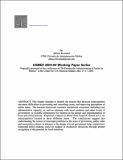| dc.description.abstract |
This chapter attempts to identify the reasons that Mexican municipalities encounter difficulties in preventing and controlling crime, and improving perceptions ofpublic safety. The research framework considers institutional constraints, including localadministrative capacity, as well as relations with local residents and other levels ofgovernment, as possible explanations for failures in the design and implementation oflocal anti-crime policies. Empirical evidence is drawn from research carried out in sixmunicipalities located in three different states. The conclusions suggest thatunderstanding the source of municipal problems in the areas of prevention, public orderand local police reform, as inherent in the design of local government helps explain howmunicipal policy-making could be nudged in productive directions through greaterrecognition of the potential for local initiatives. |

